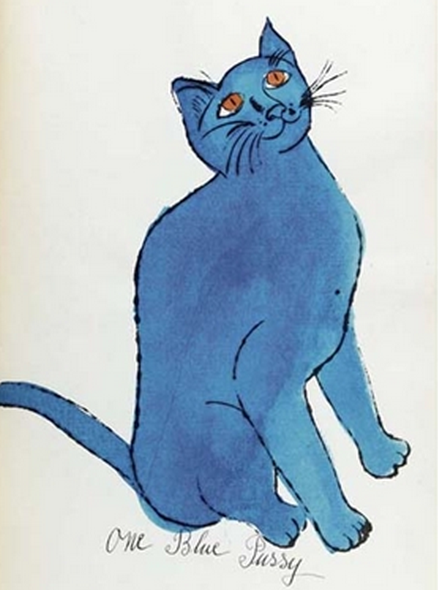 Though normally an early riser, I could not wake up in these last weeks before daylight savings time. I slept through phone calls, alarm clocks, even my neighbors’ noisy morning sex. Finally, my cat Grace took matters in her own hands. Not by yowling or ruining furniture or biting my toes but by carefully dragging all her toys next to my head, one by one, until I finally opened my eyes. Each morning I was greeted by a pile of soft feathers and strings and catnip mice and her sweet, worried face—the gentlest landing from a flight of sleep I could imagine. It reminded me of how lucky I am to live with such a considerate, tender-hearted little being. And how proud I am to be a cat lady.
Though normally an early riser, I could not wake up in these last weeks before daylight savings time. I slept through phone calls, alarm clocks, even my neighbors’ noisy morning sex. Finally, my cat Grace took matters in her own hands. Not by yowling or ruining furniture or biting my toes but by carefully dragging all her toys next to my head, one by one, until I finally opened my eyes. Each morning I was greeted by a pile of soft feathers and strings and catnip mice and her sweet, worried face—the gentlest landing from a flight of sleep I could imagine. It reminded me of how lucky I am to live with such a considerate, tender-hearted little being. And how proud I am to be a cat lady.
These days the words old maid or spinster may be dismissed as outdated, even cruel, but cat lady is still bandied about unreservedly and with the same intent: as a derogatory term for an unattached female. A single woman in a Mrs. Whatsit getup of coffee-stained schlubby layers who reads dog-eared paperbacks, never misses her shows, eats from cans along with her furry wards. Who hasn’t got laid in decades and couldn’t if she tried. Who languishes in a cramped, overheated, urine-stained apartment piled high with dirty dishes, cigarette smoke, ratty furniture, and, of course, cat hair.
If it sounds awful, so be it. That’s the mishegas that gets thrown my way because I am Of A Certain Age and remain unmarried, childless, and domestically solitary save for a feline cohabitant—especially now that nearly everyone can get married and have kids. Forget about the fact that I live in an amazing city, enjoy my work and friends, love my considerate and charismatic roommate. Because she is a cat, there exists a two-word phrase that people can use to dismiss my life.
I am cat lady, hear me purr.
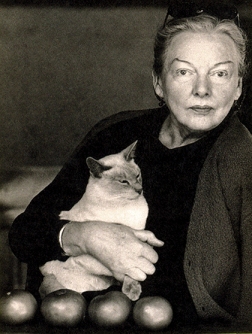 I have a theory about why dogs rather than cats are culturally embraced right now. Regardless of their actual biological sex, most cats embody traits largely accepted as feminine: They wait and watch before they act; they groom themselves carefully; they move delicately and deliberately; they dispense their affections selectively but ardently. Which is wonderful except that, despite perfunctory stabs at feminism, most of us still malinger in a collective psychosis that vilifies femininity even as we objectify and fetishize it. I think independent femininity in all species is feared even more than it was a half-century ago, when the likes of Gloria Steinem, Audre Lorde, Adrienne Rich and Angela Davis kicked ass in their aviators and big hair with nary a man to prop them up. There were no bicycles for those fish.
I have a theory about why dogs rather than cats are culturally embraced right now. Regardless of their actual biological sex, most cats embody traits largely accepted as feminine: They wait and watch before they act; they groom themselves carefully; they move delicately and deliberately; they dispense their affections selectively but ardently. Which is wonderful except that, despite perfunctory stabs at feminism, most of us still malinger in a collective psychosis that vilifies femininity even as we objectify and fetishize it. I think independent femininity in all species is feared even more than it was a half-century ago, when the likes of Gloria Steinem, Audre Lorde, Adrienne Rich and Angela Davis kicked ass in their aviators and big hair with nary a man to prop them up. There were no bicycles for those fish.
That said, I didn’t entirely choose my status as a cat lady. I like kids, and not only have goddaughters but real friends under age 12. At times I have lovers, even partners. I have come close to being married a few times, and have been pregnant twice though I have never given birth. I also grew up in a way that makes sharing my life difficult as an adult. So my life isn’t necessarily what I chose but I do like it most of the time and, even more importantly, live it on my terms. In this capacity I am aware I am very, very lucky. I also am aware that the price I pay for both these facts is that I am alone too much.
Which leads me to my cats.
I’ve lived with three in my life—four if you count Aretha Franklin Rosman, the club-footed calico who showed up when I was three months old and died three months after I left for college. (Neither of us wished to live in my parents’ house without the other.)
Max and Ruby were my first two wards, although I was really theirs. A beau rescued hoarse, malnourished Ruby while I was out of town. My initial response might have been, “When we break up, she’ll be your responsibility,” but I surprised all of us by loving her more than I’d ever loved anyone, including him. I loved her so deeply that, though I’d sworn one cat would be more than enough, I found her a mate, whom I named Max, lest she be lonely.
Soon after, on a lazy summer afternoon, I was yanked awake from a nap by Ruby sternly cleaning Max’s and my head. The three of us gazed at each other in a silent complicity, and in that moment I glimpsed what family really could be.
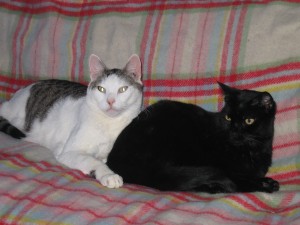 For more than a decade Max, Ruby and I lived together in domestic bliss, with only short-term additions to our household. From Ruby, nurturing yet firmly decorous, I learned to love someone very different from myself. From Max, as emphatic and acutely sensitive as I am, I grasped something even more elusive: how to love someone like myself. And then came Grace.
For more than a decade Max, Ruby and I lived together in domestic bliss, with only short-term additions to our household. From Ruby, nurturing yet firmly decorous, I learned to love someone very different from myself. From Max, as emphatic and acutely sensitive as I am, I grasped something even more elusive: how to love someone like myself. And then came Grace.
Six months after Ruby died of cancer, I began to seek another companion for Max. Though I was miserable about replacing her, I knew he wasn’t going to survive without a new love. Since Ruby was always the best witch I knew—I didn’t name my intuition practice after her for purely sentimental reasons—I asked for her help. I said, “Send me someone for Maxie and I’ll be sure to adopt her” and that night dreamed she was playing with a orange and grey striped female tabby with large eyes. The next morning, I received a text from a colleague containing the spitting image of that cat with a note: “This kitten showed up on my friend’s stoop last night. Something tells me she’s yours.”
She was, and I named her after from whence she came: “Grace.”
She and Max took to each other immediately. Whenever I approached her, though, she’d race to his side and nurse fruitlessly, nervously at his nipples while he’d pat her head and stare at me balefully. With her gold and silver stripes and baby tiger ways, she was adorable but mostly I loved Max and loved that they loved each other.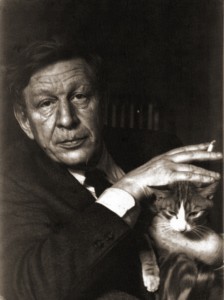
It was not until Max died that I saw a different side of Baby Kitty Grace. He’d had cancer for months before I finally accepted he was too loyal to leave without my permission. When the vet came to euthanize him, Grace, who until then had shied from most ministrations, quietly groomed his head and wasted carriage. And as the lethal shot took effect, she bathed his paws with her tongue—kissed them over and over, really, in a manner that felt ancient, biblical. Right. When his breathing stopped, she turned her small head and sat down next to me for the first time.
After that, I knew we’d be OK together.
I firmly believe we inherit the friends, lovers, families, coworkers, and, yes, pets from whom we will learn the most. I believe the people we know, especially our animals, can help us pull back whatever layers exist between our daily selves and our true selves, what I call the soul. The best Aretha and I could summon was a grim solidarity: the survivalism of two people who together could endure whatever life threw their way. From Max and Ruby I learned I actually could love and be loved—which, really, is everything. And from Grace, I have learned to anticipate the needs of this shy, unassuming person who’ll never herd me into caretaking the way her tough-love predecessors always did. Abandoned by two mommies now, this wee being still needs nurturing of the sort I never received myself. To keep her dear heart alive I’ve had to learn how to mother us both.
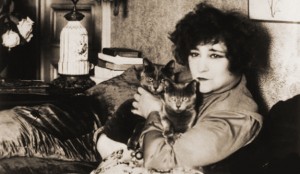 The rewards have been infinite. As we’ve learned to live together alone, we’ve settled into each other’s ways as I’ve never settled into anyone’s. The more she accepts that I only wish her well, the less she fears my clamor. The more I know she’ll accept my love, the less I feel compelled to force it upon her. As she has aged, she has remained a permakitten: only six pounds, she squeaks rather than meows, scampers from the slightest ripple of unanticipated activity, waits for me to kill scary bugs, chases her tail with great glee.
The rewards have been infinite. As we’ve learned to live together alone, we’ve settled into each other’s ways as I’ve never settled into anyone’s. The more she accepts that I only wish her well, the less she fears my clamor. The more I know she’ll accept my love, the less I feel compelled to force it upon her. As she has aged, she has remained a permakitten: only six pounds, she squeaks rather than meows, scampers from the slightest ripple of unanticipated activity, waits for me to kill scary bugs, chases her tail with great glee.
She loves me most when I am writing or singing, which is also when I love myself most, and in those times creeps on my lap and gazes at me with a green-eyed tenderness that surgically opens my heart. I love her best when she is being brave, which is really every minute of the day. I know she still interprets any disturbance as a sign that the jig is up—that she’s going to have to scavenge from trash cans on 4th avenue again—and so my heart expands every time she dares to greet a new person or remains on my lap when I am loud.
Last December, I got her neutered. The protracted, fatal diseases of two cats had left me both broke and fearful of vets but Gracie’s sexual heats were starting to embarrass us both. After much dragging of my heels, I brought her to an ASPCA mobile unit out in deep Brooklyn.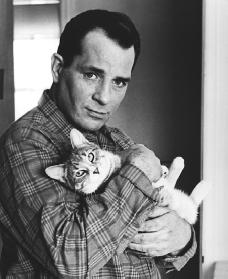
It was a sketchy if affordable solution. At 6:30 am, Grace and I waited on the street with other pets and their caretakers until each animal was absorbed into the caverns of the ASPCA silver truck. I was afraid that the shock of the cold air and the street noise, the humiliation of being inspected in the presence of so many others, would compound the normal trauma of a surgery but was assured she’d be fine when I picked her up in the afternoon. So I handed my charge to the briskly kind ASPCA worker and made my way home with an empty carrier.
Because the city was still reeling in the wake of the Superstorm, I didn’t think twice when I kept hearing the term “Sandy” that day, at least not until every media outlet was reporting on the shootings at the Sandy Hook, Connecticut elementary school. So many New Yorkers had been living without heat, electricity, and running water, and so many had lost homes, cars, jobs, even lives, that we’d all been overextended and numb for months. But the loss of so many children broke me down.
I rushed back to the street corner where the ASPCA truck was stationed. Most of the other pet parents were already waiting outside. Though it was only 4:30 it was getting dark, and none of us were adequately protected against the bitter winds blowing down the streets. We were a motley crew united by our love for our pets and by the financial limitations that had forced us into this solution, and in the morning had joked about all of it while huddling together. Now, as the sun dropped behind us and we awaited our animals’ return, we stood more solemnly. “I’m so nervous,” said a tall woman with a big hat who’d been hilariously outspoken earlier. “You just never know.”
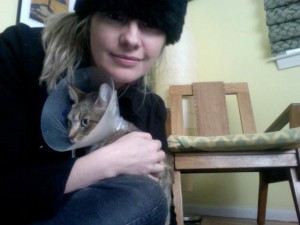 “Part of me was afraid the truck wouldn’t even be here when we got back.” I said.
“Part of me was afraid the truck wouldn’t even be here when we got back.” I said.
“And when I saw the news….,” said a teenaged boy with bright yellow sneakers.
We were all quiet.
“Let’s pray for the babies,” said an older woman, finally. We bohos and church ladies and neon mamas and little b boys bent our heads in that cold night. Some of us sniffled. A few wept openly.
And then the door to the mobile unit flung open and we crowded in to collect our precious, precious friends.
